Gadamer, Herder and the Women Philosophers of the Long Nineteen Century
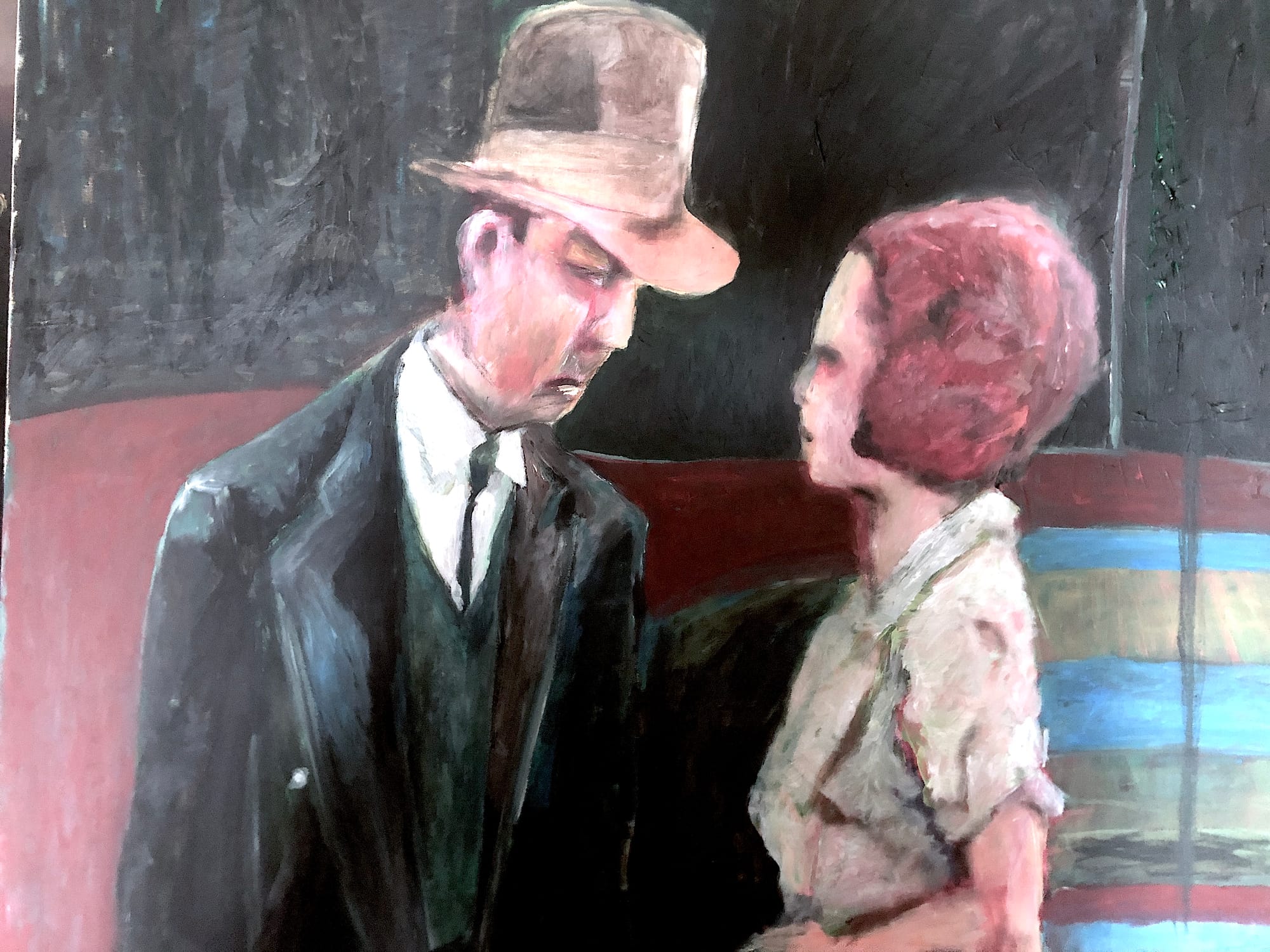
Interview by Richard Marshall
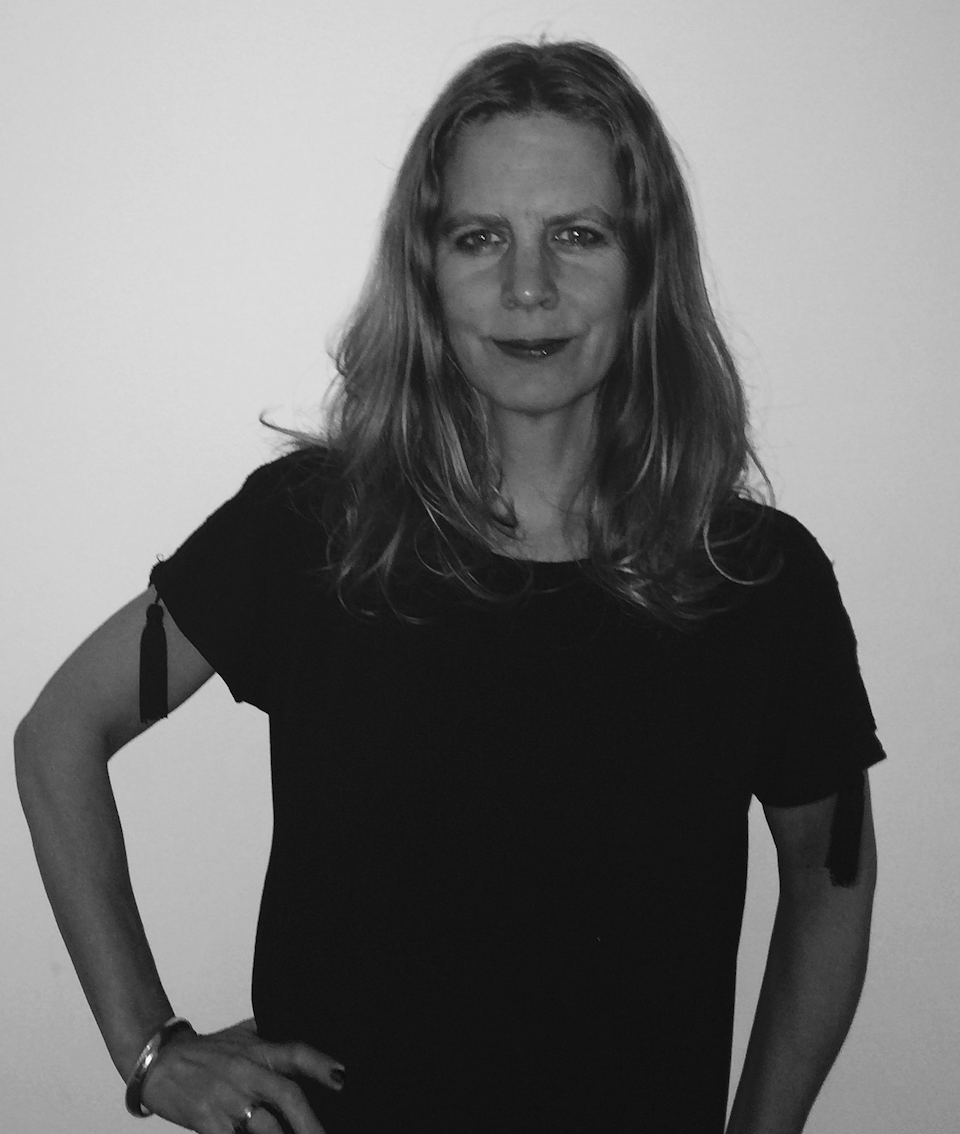
'Herder remains suspicious of grand philosophical systems and views them as potentially unscientific. What is of interest from the point of view of hermeneutics, though, is how he seeks to articulate a methodological, bottom-up, as he calls it, approach to understanding and insists on the need to situate the meaning of a given expression within its historical, linguistic, and cultural context. For him, this is a question that arises out of an anthropological, partly also political and cosmopolitan motivation. He offers an early discussion of prejudices, of the way in which our own cultural ideals and practices are easily ascribed an illegitimate normative status.'
'It is not that long ago that Hegel or Nietzsche were not frequently read in philosophy departments in the Anglophone world. If we, say, consider the development of Nietzsche scholarship from Kaufmann to our day, it is quite astounding how this field has developed. More recently, figures beyond the great idealists have been added: Herder, the Humboldt brothers, the Schlegel brothers are now routinely taught. And once we broaden the field to include more voices and philosophical methodologies, once we get attuned to the fact that our canon does not necessarily represent the diversity of positions held at the time, a whole host of exciting positions and thinkers emerge, many of them women. And, again, what is so fascinating is that somebody like Georg Brandes or Henrik Ibsen would be familiar with these women philosophers…and yet we are not.'
'Brentano-von Arnim was close to the left-Hegelians, and she met with Karl Marx. So here we see, very clearly, a line from romanticism to Marxism. This line is not clear if we follow the philosophical trajectories of romantics such as Novalis or Friedrich Schlegel. '
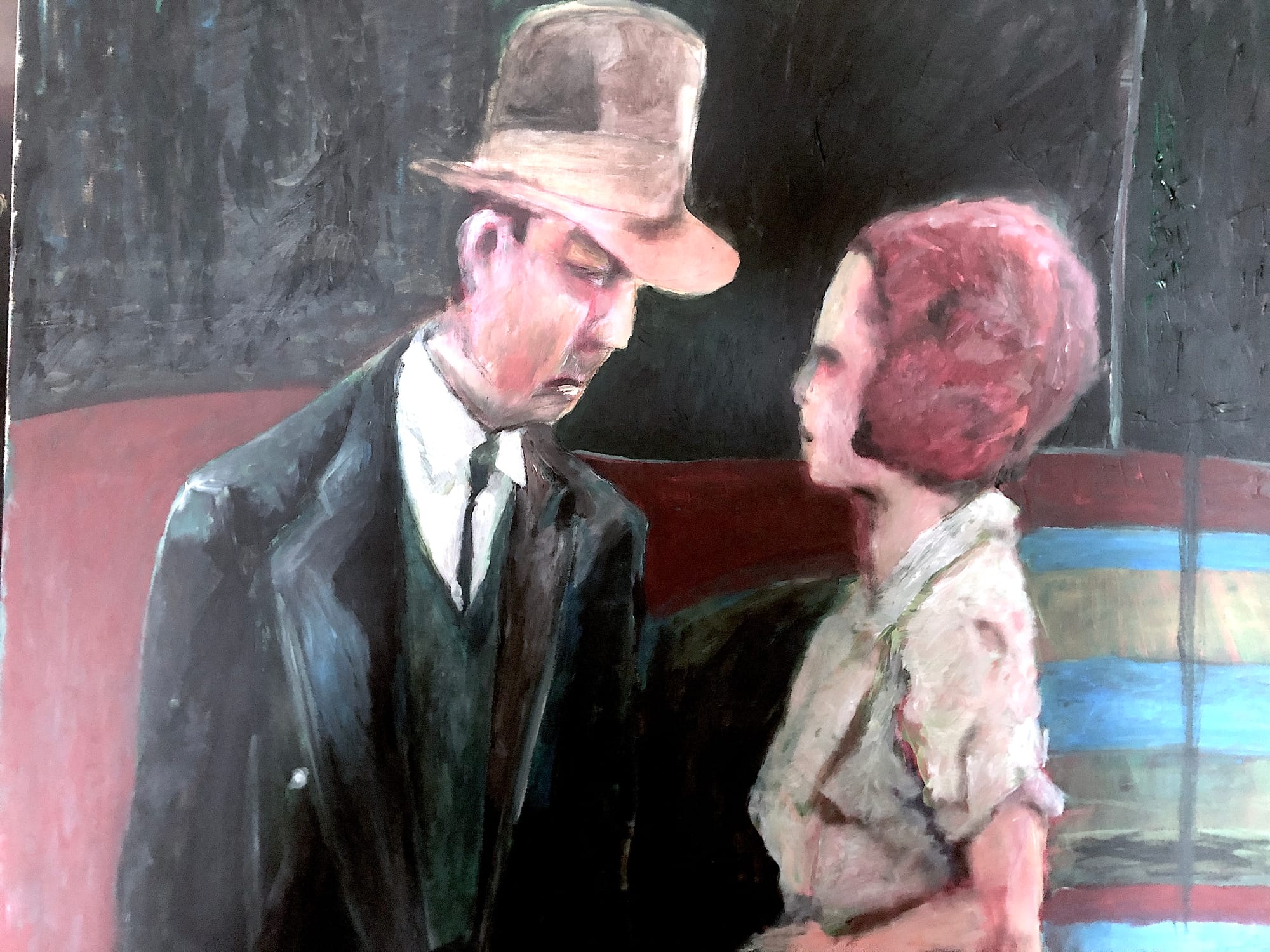
Kristin Gjesdal is a philosopher working in the fields of Hermeneutics, Nineteenth-Century Philosophy, Aesthetics and Phenomenology. Here she discusses bildung, Gadamer, issues with Gadamer's notion of 'tradition', early 19th century hermeneuticals, Herder's hermeneutics, his 'anthropological turn', Ibsen, drama and philosophy, women philosophers of the long nineteenth century - canons, why women disappeared, progressives and non-progressivesin the nineteenth century - and finally the philosophical lineage running from romanticism to phenomenology, largely in Germany.
3:16: What made you become a philosopher?
Kristin Gjesdal: I am afraid I don’t have a particularly interesting story to tell. Like many humanities professors, I was an avid reader—novels, philosophy, anthropology, whatever was floating around in the house and in local libraries. I took philosophy classes in high school. And I guess that was it. After a stint with history of ideas and literature, I realized that what I really wanted to do was philosophy. Throughout my graduate studies, though, I did a bit of work for newspapers and the national public radio in Norway. I also edited a literary journal for the Scandinavian University Press, then moved on to edit two lengthy series of translated works in philosophy and literature called Pax Palimpsest and Literary Palimpsest, 18 books each. In this sense, my socialization into academic philosophy was always accompanied by an awareness that philosophy can and should have a broader, cultural role to play, and that it is not necessarily a bad thing for philosophers to stray beyond the boundaries of academia.
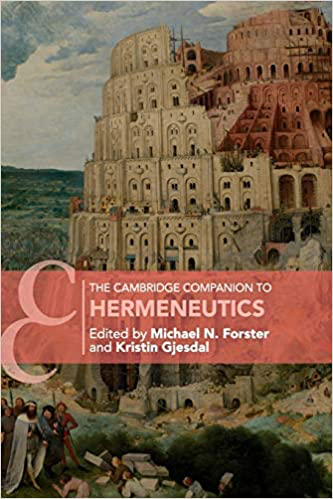
3:16: You’re an expert on German Idealism, phenomenology and hermeneutics. It seems that we aren’t going to get very far understanding what this is all about without getting an understanding of Bildung. Am I right to think that Bildung is crucial here?
KG: Yes, Bildung is a key concept. At times this untranslatable German word seems frustratingly dusty and outdated. Do we still want to talk about Bildung, that is, education or self-formation through culture and history? Don’t we have a more updated way to address what is going on in humanities classes and seminars? And yet we have failed to come up with a better term for one of the key missions of the humanities and the social sciences, namely to offer a historical understanding or genealogy of our culture, one that can help us come to terms with our contemporary world and plot a meaningful path forward. Modern philosophy is constantly under pressure from the natural sciences, and oftentimes strives to be a science in this sense.
I worry that philosophers are sometimes too quick to let go of their ties to the humanities and the critical social sciences. One of the ways in which the history of philosophy is relevant is that it exposes us to the most challenging and best honed models for understanding human rationality, truth, goodness, value, politics, and so on. Literature, film, visual and performative arts also seek to do so, though in different ways. But does that mean we should cut our ties with them? As I see it, that would be foolish. So, from that point of view, I agree with more traditional defenders of a broad notion of Bildung, both the early modern (humanist) thinkers and twentieth-century philosophers such as Gadamer.

3:16: Gadamer approaches hermeneutics from a position of seeking Bildung and self- transformation via readings of traditional texts or a canon of some sort, doesn’t he?
KG: Gadamer, in my view, is not a particularly clear thinker and the structure and arguments of his main work, Truth and Method, are quite frustrating. Yet Truth and Method helpfully articulates the challenges that characterized a cultural and disciplinary stage in post WWII Europe. We are in the 1960s and Gadamer responds to what he sees as a new and rather reductive scientific paradigm that threatens to reduce truth to a question of mere methodology. The texts of the canon were no longer approach in terms of their truth, their ability to “address us” across centuries and decades. Instead they were turned into objects of scholarship and historical-biographical reconstruction: subject to studies shaped along the lines of the natural sciences and not properly acknowledged as the result of the meaningful expressions and preservation of fellow human beings.
Gadamer’s position—and the ensuing debates with Habermas and others—was formative for later German and anglophone philosophy. Gadamer sought, as it were, to adopt a Hegelian insistence on the connection between historical self-understanding and self-determination—unless we understand how our points of view are rooted in tradition, we risk overlooking the presentism and hidden shortcomings that our contemporary positions shelter—but without the metaphysical notion of absolute spirit. Similarly, we see him draw on Heidegger’s turn towards human (Dasein’s) self-understanding, but without buying into a full-fledged Heideggerian ontology. From this point of view, Habermas is right to suggest that Gadamer urbanizes the Heideggerian province.
I assume it is this lighter, mostly non-metaphysical take on history and self-understanding that made Gadamer’s work interesting to Richard Rorty and Donald Davidson. More recently, John McDowell and Robert Brandom have turned to Gadamer. I think, though, that you are right that Gadamer, at the end of the day, is committed to a notion of self-transformative truth: through the engagement with canonical texts and works of art—literature, painting, philosophy, science—we are challenged to question our prejudices, implicit beliefs, and, ultimately, even our existential parameters. Gadamer speaks of this as a happening of truth. At times, especially in his early work, he lays this out by reference to a dialogical rationality. Other times, it seems more like a sudden, sublime transformation. Gadamer sees no conflict between these two accounts.
But here I disagree. In my view, there is an unresolved tension in twentieth-century hermeneutics between, on the one hand, the ideal of a dialogical, philosophical relation to the past and, on the other, a tendency to hypostatize the validity of the tradition, to let it “address” the speaker with its truth, and thus to give tradition a kind of epistemic, perhaps even ethical and existential primacy vis-à-vis the individual interpreter. Such a notion of tradition risks being utterly conservative.
3:16: You criticize Gadamer for this approach, don’t you, on the grounds that tradition can inculcate prejudices and reinforce prejudice as well as expand self-understanding?
KG: My first book, Gadamer and the Legacy of German Idealism (CUP 2009), was an attempt to think through the strengths and limitations of twentieth-century philosophy of understanding and interpretation. I take Gadamer to be the most influential voice in this line of thought. From this point of view, his position is worth engaging, even for those who, like myself, disagree with it. In particular, I was interested in clarifying how his position grows out of German Idealism: Kant, Hegel, and so on. Heidegger was one of Gadamer’s teachers. Like Heidegger, Gadamer initially sought to position himself as an alternative to neo-Kantianism. Some of the debates that emerged in the wake of Truth and Method (Habermas, Apel, and others) moved on the assumption that there is a fundamental philosophical schism between Kantianism and phenomenology. In my view, the relationship is more complex.
Like the young Heidegger, Gadamer seeks to critique Kant and Hegel from within: to keep what he finds worth keeping while all the same exposing what he takes to be their ahistorical notions of self-determination (he does indeed include Hegel here, mainly with reference to his notion of absolute spirit). My goal, though, was not simply to clarify Gadamer’s indebtedness to Idealism, but to use this approach to get a better grasp on both the potential and the limitations of twentieth-century hermeneutics. In my view, Gadamer’s rejection of critical methodology (which he traces back to Descartes and Kant) leaves him with far too naïve a notion of tradition: Tradition, for him, is ascribed authority vis-à-vis the individual interpreter.
The works of tradition have gained a richness of meaning by being interpreted in ever-new contexts. They are formative, moreover, of the horizon in which the interpreter finds herself. Shakespeare’s Hamlet, say, has fed into and shaped our understanding of existential angst and melancholy and we are formed by these ideas even before we’ve actually read the work. But how, we need to ask, can we have a genuine dialogical rationality if we are dealing with a completely asymmetrical relationship between the two conversation partners? It does not take much to see that the tradition may harbor great insight, but also prejudices, biases, and injustice. This obviously applies to literary writers, artists, and philosophers alike. We need to keep the tradition alive not simply by reading and rereading the so-called canonical works, but also by challenging the existing canon and the values and interests by which it is upheld. In my view, Gadamer’s model offers a helpful description of how canons and traditions are sustained: the central works are being passed down from generation to generations, we discuss their meaning, we read them in ever new contexts and relate to them in ever new ways.
However, the fact that Gadamer may well offer a descriptive (or phenomenological) account of the way in which canonical works maintain their status does not mean that the model can say much about whether or not these works ought to be treated in this way or, even more importantly, what other works were sidelined or pushed into oblivion as the canon was established. There is a problematic slide, in this hermeneutic model, from the descriptive to the normative level. It fails to consider the institutional pressures and power structures that play in when a canon or a tradition is being formed and, later, upheld.
Here is one example: Women philosophers played a significant role in our tradition. Yet their works are hardly read today. It gives even more pause for thought when we start taking into account how their works were pushed into the background, with renewed force, at the time when women were starting to insist on a right to higher education and suffrage. It should give us pause that some eighteenth-century histories of German philosophy did indeed include more women than what we today find in standard histories of the nineteenth century. In this case, the work of tradition has definitely not served us well. What we need is a critique of the tradition and self-critique from within the discipline.In today’s discussion of new narratives and more inclusive canons, there should definitely be a central role for hermeneutics to play. And yet I fear that a Gadamerian model, with its emphasis on the (Western) tradition, will serve more as a defense of the status quo than a guide that can help us think through the philosophical gains of producing historically more accurate and intellectually more satisfying genealogies of modern thought.
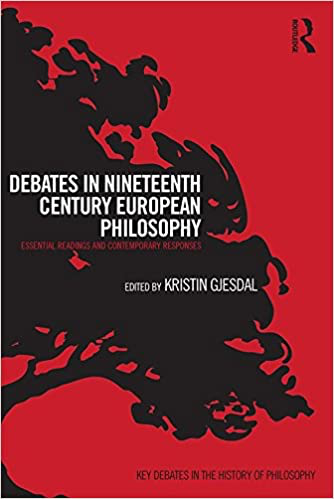
3:16: Is it because of this tendency that you go back to look at the early nineteenth-century hermeneutical guys Herder, Schleiermacher, Hegel, Schlegel, Humboldt and so on? What do they do that corrects Gadamer’s approach?
KG: Gadamer, as I see it, presents far too polemical a picture of previous hermeneutic models, especially those that are associated with the Enlightenment. He draws a line from Descartes, to Kant, Schleiermacher, and Dilthey and views this a path towards an increasingly one-sided focus on ahistorical methodology. He contrasts Schleiermacher’s focus on individuality and Hegel’s focus on world-history. He opposes Dilthey’s emphasis on the methodology of the humanities and Heidegger’s existential approach. I agree that these are important schisms in modern hermeneutics. However, I see Gadamer’s exposition of Schleiermacher’s and Dilthey’s contributions as rather unhelpful. These thinkers are not naively Cartesian or Kantian in the way that he presents them (nor, for that matter, were Descartes or Kant!). Instead, Schleiermacher and Dilthey seek to develop the more anthropological and empirically oriented philosophy that thrived around Herder and the early romantics.
Once I had completed my book on Gadamer’s hermeneutics, I wanted to explore this alternative hermeneutic lineage and ask what systematic resources it could offer. This was my project in Herder’s Hermeneutics . Hermeneutics is a broad field and there is no linear development from, say, Schleiermacher to Heidegger. Instead we have sets of constellations and alternative ways of thinking about understanding. I am interested in maintaining the richness of this field in view and insist on hermeneutics being a field of different positions and approaches, rather than a progressive development that is crowned by works such as Heidegger’s Being and Time or Gadamer’s Truth and Method .
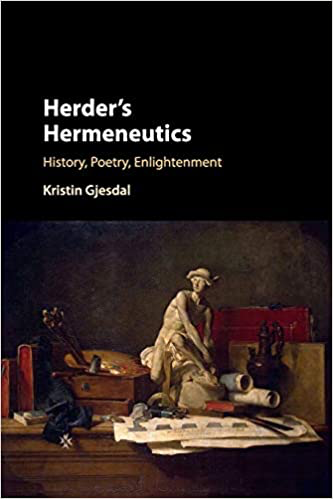
3:16 : So why don’t we know as much about Herder or think of him as seriously as we do Kant or Hegel, Hume or Leibniz or even Schelling?
KG: Herder scholarship has had some good years now. Solid and exciting philosophical studies have been published by Zuckert, Forster, Zammito, and many others. We have seen a similar renaissance for Alexander von Humboldt and other philosophers who share Herder’s empirical-anthropological approach. The history of philosophy is often written in terms of big names and movements that can easily be labeled. Somehow German Idealism and the ‘von Kant bis Hegel’-narrative has dominated scholarship on the late eighteenth and early nineteenth century. Needless to say, this narrative was itself shaped, at least in part, by Hegel’s powerful account of the development of German philosophy, culminating in his own notion of absolute spirit. It is, though, important to acknowledge that there were alternatives, at the time, to the idealist turn in philosophy.
Herder is one figure who articulates such an alternative. He was initially a student of Kant but refused to follow his mentor through the transcendental turn. In his epistemology, his ethics, his political philosophy, and his philosophy of understanding, Herder remains suspicious of grand philosophical systems and views them as potentially unscientific. What is of interest from the point of view of hermeneutics, though, is how he seeks to articulate a methodological, bottom-up, as he calls it, approach to understanding and insists on the need to situate the meaning of a given expression within its historical, linguistic, and cultural context. For him, this is a question that arises out of an anthropological, partly also political and cosmopolitan motivation. He offers an early discussion of prejudices, of the way in which our own cultural ideals and practices are easily ascribed an illegitimate normative status. This, as I see it, is rather different from Gadamer’s emphasis on the authority of the tradition: his notion that the tradition makes up a fundamental or ontological aspect of our being-in-the-world.
If we trace modern hermeneutic back to the kind of commitments we find in Herder’s work, we end up with a very different story—and a very different set of systematic questions—than the one provided by Truth and Method . This, in short, is a critical , not an ontological hermeneutics. It is interesting that Dilthey is aware of Herder’s significance for early hermeneutics and his influence on Schleiermacher. Once Schleiermacher is read with an eye to this inheritance, it is easy to see how his early work defends a notion of understanding that is rooted in pluralism: for him religion, for example, exists in the plural and so do human beings and their various outlooks and points of view. If we try to understand others primarily from our own point of view or position we risk projecting our own preferences and ideas on to them. Taking seriously this aspect of Schleiermacher’s work, we can even see how his hermeneutics, as it was the case with Herder, is related to his critique of Western imperialism.
Another relevant figure in this context is Germaine de Staël. She is, as I see it, a philosopher who spots, early on, the philosophical affinity between Herder and Schleiermacher and seeks to further develop this lineage of thought through her abolitionist work, her discussions of implicit and explicit bias and prejudice, and her critique of the (Kantian) autonomy-model in aesthetics.
3:16: Just so we get a sense of Herder’s overall achievement: how would you characterize his ‘anthropological turn’? Zammito and Beiser suggest that Herder’s impetus was to leave philosophy behind and pursue empirical science, but you don’t think this, do you?
KG: The anthropological turn has gotten a lot of press lately. It is of course a very catchy phrase. However, when Herder criticizes philosophy, he usually has a very specific philosophy in mind. He is not, as I see it, critical of philosophy as such, but of a particular kind of philosophy: rationalism and school philosophy. He is also critical of a priori system building and of philosophical abstractions. But being critical of a particular kind of philosophy is not the same as being critical of philosophy as such. As I see it, Herder is and remains a philosopher, and he seeks to revise philosophy from within. In setting out to undertake this endeavor, it is particularly important for him that philosophers acknowledge their situatedness within a given historical period and culture and reflect on how this both enables and limits their thought. A philosophy that overlooks this commitment remains, as he sees it, pre-critical. This, more or less, is how I read his anthropological turn.
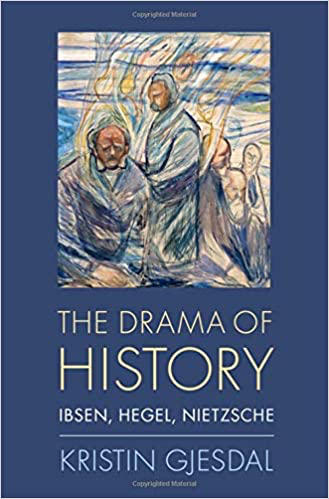
3:16: How does your study of Ibsen, Hegel and Nietzsche fit in or develop themes and ideas salient in your work on Herder and hermeneutics?
KG: The Drama of History: Ibsen, Hegel, Nietzsche (OUP 2021) did indeed grow out of my interest in Herder and German Idealism. For Herder—as it would be the case for A.W. Schlegel, Hegel, and others—drama is a particularly important and philosophically pregnant artform. It is important to keep in mind that this was a period when new, extremely prestigious playhouses and theaters were being built. Theater was at the heart of culture, and no proper town did not have or want to build a theater. Lessing held the position as dramaturg at the grand new theater in Hamburg. Herder, too, was interested in drama—and sees drama as key to a larger cultural understanding.
He observes how the theater has been politicized. The German-speaking stage had been dominated by Francophile classicism. From within this paradigm, Shakespeare was taken to be a lesser dramatist, sometimes not a dramatist at all. His work was perceived as unorganized, chaotic and, in his play with class, sociolect, and supernatural phenomena even a political and theological affront. Herder, however, insists that the ancients (or the French classicist approach to the ancients) cannot serve as an artistic ideal for modern drama. For him, it is precisely because Shakespeare portrays characters from high and low, urban centers and rural provinces, that he should serve as an example for modern German-language drama. But mostly, Herder uses this German Shakespeare debate as an occasion to make more general philosophical points about how taste tends to be relative to a certain culture. In this sense, there is a clear link between the question of taste and that of hermeneutics: we often misunderstand others because we interpret their statements or expressions on the basis of our own values and beliefs.
The young Ibsen was interested in the debates about Shakespeare and modern drama. He was also, initially, interested in historical drama, which was enormously popular in the German language context. Indeed, as I see it, history and human historicity are two central topics that run through Ibsen’s entire oeuvre, his late as well as his early work. Moreover, Ibsen lived and wrote in a culture where romanticism, Hegelianism, and eventually Nietzscheanism, featured centrally—both in debates about theater and in culture more broadly. Stage directors would refer to Hegel in justifying their programs. Critics, likewise, would be philosophically informed and motivated. Philosophy really had a life beyond academia. And the connection between drama and philosophy is, in my view, an area in which this interaction takes a particularly productive form.
It is this connection I explore in my work on Ibsen and the philosophers. The point is not that Ibsen simply stages or applies philosophical ideas that could easily be formulated otherwise, but that he critically engages philosophical worldviews and tests them out in the context of individual lives and fates.
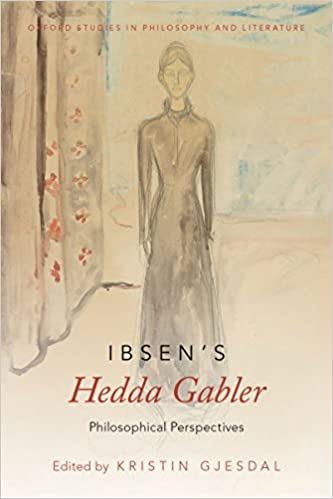
3:16: Up to the 1870s you contend that Ibsen is gripped by Hegelian themes, as was Scandinavia, don’t you? How did his plays develop until they went, with A Doll’s House, beyond late romantic instantiations and the limitations of Hegel’s understanding of art?
KG: It is fair to say that Ibsen started as a romantic. His early work communicates with the works of Herder, for example. Indeed, it shows, apropos your question above, how important Herder’s work was at the time. After a while, Hegelianism became the go-to philosophical model for the theater crowd. We find Heiberg, a Hegelian, in charge of the Royal Theater in Copenhagen. Hettner’s Hegelian study on theater is a key text for Ibsen. A Hegelian art historian is a friend and travel companion during Ibsen’s stay in Rome. Again, it is interesting to see how philosophy, in this period, resonates far beyond academia. It is also worth noting how the philosophical map, at the time, looks somewhat different from the map we today take for granted. Positions were differently combined and configured. Philosophy of history, for example, was seen as central to the romantic movement and closely related to its philosophy of art. From this point of view, a transition from romanticism to Hegelianism was relatively unproblematic, indeed quite common at the time. Likewise, Georg Brandes, who was one of the first to lecture on Nietzsche, transitioned from an idealist position to being a Nietzschean of sorts.
The philosophical orientations of Ibsen’s circles also included women philosophers such as Germaine de Staël, Lou Salomé, and Hedwig Dohm. So if we want to trace the interaction between philosophy and drama at the time, we need to reconstruct the philosophical landscape that Ibsen was presented with and not take for granted that his philosophical map necessarily can be matched onto ours. That being said, I want to emphasize that when I talk about Ibsen’s philosophizing, I don’t mean that he holds a particular philosophical position or set of positions. He is and remains a dramatist, not an academic philosopher. When he turns to philosophy, it is not to get arguments or systematic trains of thoughts. Instead he explores worldviews and allows his dramatic characters to existentially try out these foundational positions, bring them as far as an individual life and fate can hold, and zoom in on them as they burst and implode. It is in this sense that Ibsen’s drama, even though it should not be associated with any one particular philosophical school or position, still philosophizes. This is also, I think, what made his work so fascinating to philosophers from Freud to Adorno, Sartre, de Beauvoir, Cavell, and many others.
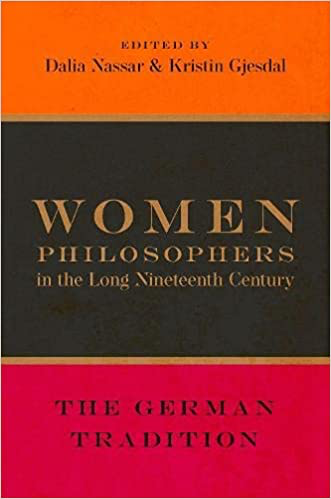
3:16: In your Women Philosophers of the Long Nineteenth Century several things leap out. One of them is the potential changing face of canonical texts from that time. It’s already been an evolving thing, with certain male philosophers now firmly part of the canon that originally were excluded, but now there’s increasing awareness that women’s contributions were important and need to be acknowledged. Were women deemed important at the time and then forgotten or deliberately excluded as a matter of sexism? I think you suggest that the influence of Hegel was important in this, wasn’t it, as he adopted a negative stance towards intellectual women, didn’t he? Does your research show that actually there was a genuine debate about the importance of women philosophers throughout the period, and several men, like Hippel, the Schlegel brothers, Schleiermacher supported the position of women in philosophy which makes the positions of those who didn’t, like Hegel, Fichte and Kant inexcusable and not a general position of the times but more like a reaction to other views being expressed?
KG: Women Philosophers in the Long Nineteenth Century: The German Tradition (OUP 2021), which I have co-edited with my colleague and friend Dalia Nassar (Sydney), is part of a larger research project. The volume offers introductions to, and translations of, works by nine central nineteenth-century women philosophers. You bring up a lot of important questions about this project. Let me try to answer one group of questions at a time.
Your first question is about canons. Yes, you are right that Dalia and I point out that the nineteenth-century canon has been in a process of expansion for quite a while. It is not that long ago that Hegel or Nietzsche were not frequently read in philosophy departments in the Anglophone world. If we, say, consider the development of Nietzsche scholarship from Kaufmann to our day, it is quite astounding how this field has developed. More recently, figures beyond the great idealists have been added: Herder, the Humboldt brothers, the Schlegel brothers are now routinely taught. And once we broaden the field to include more voices and philosophical methodologies, once we get attuned to the fact that our canon does not necessarily represent the diversity of positions held at the time, a whole host of exciting positions and thinkers emerge, many of them women. And, again, what is so fascinating is that somebody like Georg Brandes or Henrik Ibsen would be familiar with these women philosophers…and yet we are not. There is something about the way in which the history of philosophy is written that needs to be thought through.
Dalia and I started getting interested in this when we saw how the field of early modern philosophy had successfully included more women. How plausible, we kept asking, is it that women published philosophy in the early modern period and then simply ceased to think and publish philosophy in the nineteenth century? Once we started looking, it was not too hard to find works by women philosophers. They were hiding in plain sight. We wanted our introductory volume to be manageable and helpful for teaching purposes, but could easily have put together a volume that was three or four times the length and included three or four times as many philosophers. Then to your question about how these philosophers were forgotten or excluded. Many of the women philosophers were extremely popular at the time. That is, while some women (such as Sophie Mereau) were allowed to audit philosophy lectures (e.g., by Fichte), women were excluded from tertiary education. German Universities allowed women to enroll only in 1900, but they did not have the right to defend their habilitations and qualify for academic positions. Only in the 1920s, after an appeal by Edith Stein, were women given the right to submit their habilitations, thus also to qualify for academic positions.
But it would take much longer, indeed until after WW II, until the first women actually got regular academic positions in philosophy in Germany. Switzerland was more progressive, women were allowed officially to enrolled in universities much earlier and the first woman to get be on the graduate faculty in philosophy there, the Russian-born Anna Tumarkin, defended her habilitation on Kant and Herder in 1898. Her habilitation was later published and it is still an interesting and readable work.
Oftentimes, women managed to turn their exclusion from academic discourse into an advantage: they were indeed not under pressure to write for a narrow and specialized audience. Moreover, women philosophers from this period tend to be politically engaged in some way or other. Some, but by no means all, are feminists and/or think about the nature and social role of women. Some are abolitionists and critics of imperialist politics. Some write about ecology, pacifism, and social justice. This is, to a large extent, an engaged and engaging philosophy. Much of it was, in its own time, translated and widely read. Germaine de Staël, for example, wrote a series of best-selling philosophical works that were quickly translated into a number of languages, including English. In this sense they were definitely pushed into oblivion after their own time and often after a period of considerable success. Why? It is hard to point to one single reason. I would assume we need to consider a number of factors: disciplinary insecurity, sexism, the fact that the history of philosophy has by and large been written by men. Hegel, as you suggest, was indeed influential. And he, like Kant, Fichte and many others, was not friendly towards the idea of women philosophers.
Now to your third point about the more inclusive and open-minded male philosophers in the nineteenth century. Yes, of course they do exist. Yet we need to be careful not to paint a black and white picture. Even somebody like Hegel, who was definitely no feminist, has been extremely important for later feminist thought (and, beyond that, for Fanon and philosophers of race). Schleiermacher and Schlegel, on their side, recognized the women of the salon and the importance of a semi-public sphere. However, in his later work, even Schleiermacher makes it clear that women should not participate in public life. Theodor Gottlieb von Hippel, though, is a true exception. It is quite remarkable that this friend of Kant and mayor of Konigsberg could (anonymously) publish progressive works such as On Marriage and On Improving the Status of Women (1792). On Improving the Status of Women was, by the way, published in the same year as Mary Wollstonecraft’s A Vindication of the Rights of Women , which was rapidly translated into German. Moreover, Amalia Holst had published, under her own name, on the subject of women and education.
This is important to keep in mind. When we read Kant, Fichte, and Hegel’s negative comments on women in philosophy and science, we should not assume that they represent the only view available at the time. There was indeed a debate about women’s role and Kant, Fichte, and Hegel chose not to run with the progressives. We need to hold them accountable for that –and all the same remember that we, too, probably have similar blind spots in our philosophizing.
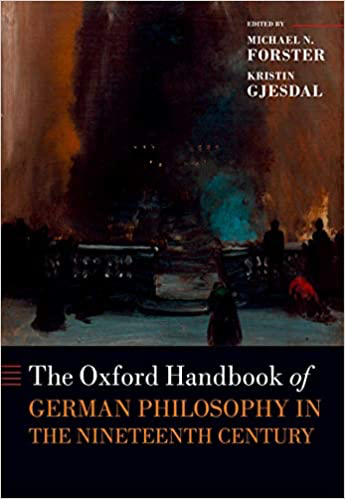
3:16: Can you say something about the philosophical lineage that runs from romanticism to phenomenology that they were involved in—and one that wasn’t exclusively German although Germany was a key place, wasn’t it?
KG: Sure, that is an interesting dimension of this historical work. Dalia and I both felt that we were reasonably familiar with the landscape of nineteenth-century thought. However, what we realized once we started to include the works of women philosophers is that their works disclosed new lines and connections. One example is Bettina Brentano-von Arnim. Brentano-von Arnim was a romantic philosopher who wrote on nature, history, poetry, and language, among other things. But she was also a politically engaged philosopher. She analyzed and discussed the problem of poverty early on. She was a pioneer in developing an empirical-sociological methodology and in insisting that less privileged groups also have a voice, i.e., they need to be given a chance to speak rather than being spoken for. Brentano-von Arnim was close to the left-Hegelians, and she met with Karl Marx. So here we see, very clearly, a line from romanticism to Marxism. This line is not clear if we follow the philosophical trajectories of romantics such as Novalis or Friedrich Schlegel.
Similarly, a phenomenologist work such as Gerda Walther’s study of social communities seeks to draw on phenomenology and socialist thought. Her position is quite a change from Husserl’s, not to mention Heidegger and his affiliation with the National Socialists. In this way, women philosophers from this time period offer understudied, but really interesting positions. Dalia and I are now working on an Oxford Handbook of German women philosophers in the nineteenth century. We are almost done, and the contributions reveal many such unexpected lines, connections, and parallels. Including women in the philosophical canon is not simply a question of adding new names to an old agenda. Indeed, adding women to the canon will change our understanding of the nineteenth-century and its philosophical resources. Moreover—and even more importantly—the new work on women and other underrepresented groups in the history of philosophy should have us all pause and reflect on why it is that our discipline has been constructed in such a narrow way and what we can obtain by being more inclusive. This is something that I hope to explore in more detail, with reference to my own focus of research, in a short study of Germaine de Staël’s philosophy (under contract with Cambridge Elements) and a larger book project on women philosophers from romanticism to the revolutionary socialists and feminists of the mid- and late nineteenth century.
3:16: Finally, are there 5 books you could recommend to the readers here at 3:16 that would take us further into your philosophical world?
KG: I’d like to suggest a few books by or about women philosophers (and an artist): all authors that are not that well-known, but that, in my view, deserve to be read. I guess they are also books that will tell you a bit about what I am working on and thinking about these days.
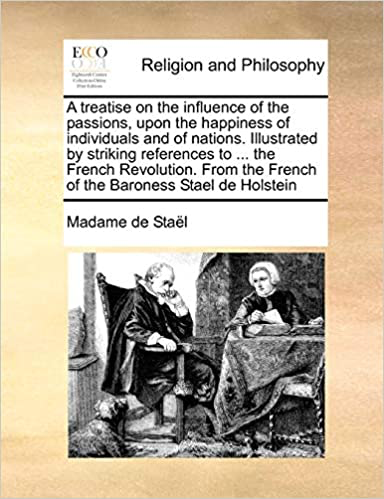
Germaine de Staël, A Treatise on the Influence of the Passions upon the Happiness of Individuals and of Nations. Illustrated by Striking References to the Principal Events and Characters that have Distinguished the French Revolution (De l’influence des passions. Paris: Edition le mono, 2021).
The title is almost a treatise in itself, but Staël’s 1796 study of the passions, translated into English two years after it was published, offers a scarily relevant discussion of fanaticism: its phenomenology, its psychological roots, and how best to tackle it. Fanaticism was a big topic in Enlightenment thought. The standard approach, though, was that fanaticism represented a breakdown in reason, typically associated with religious frenzy. Staël’s approach is different. For her, fanaticism is not approached in terms of a “they” that need to be managed or beaten down. Instead, she turns to moral psychology and asks how it is that we humans have the potential for self-undermining extremism of this kind. She traces fanaticism back to human passions that, in moderation, give us something to live for but that, when out of control, lead to self-destructive behavior. Moreover, she ditches the standard ‘fire and sword’-approach (they cannot be reasoned with, so they have to be beaten down) and emphasizes, say, the importance of friendship (rather than the standard) as a step towards overcoming fanaticism. Fighting fanaticism is, in other words, a shared responsibility that requires a building down of the we/they antagonism. A new, critical translation of this work would be much needed!
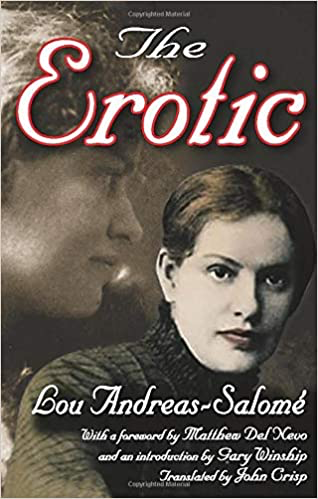
Lou Salomé, The Erotic . Trans. John Crisp (London: Routledge, 2021). Originally commissioned by Martin Buber, Salomé’s 1910 study is definitely not an easy read. But whoever gets through it is up for a philosophical treat. Salomé has often been described as Nietzsche’s muse, Rilke’s lover, or Freud’s disciple—as, in short, a collector of male geniuses. One could hardly do her a larger injustice. She is an intellectual powerhouse. The anti-dualist position she develops in The Erotic offers an intriguing approach to the mind-body problem but also discloses quite a radical position on the relationship between human nature and the rest of nature. Salomé’s contribution, moreover, is part of a larger discussion of biology, gender, and social rights. She was friendly with Hedwig Dohm—another intellectual powerhouse and, by far, the most humoristic philosopher I can think of (that should not be underrated!)—though the two take fundamentally opposite positions in the debates about biology and gender. Both philosophers are worth reading, but Salomé’s The Erotic , with its Spinozist undertones, delves straight into the key debates of modern German thought and offers a refreshingly original and provocative position.
Karoline von Günderrode Philosophical Fragments. Ed and trans. Anna Ezekiel (New York: Oxford University Press, forthcoming). The book is not out yet, but I have read the manuscript and think we all have something to look forward to. The volume presents a well-chosen selection from Günderrode’s works, letters, and notebooks. We get her thoughts on Herder, Schleiermacher, and other philosophers—and, in this way, see her position herself in the landscape of romanticism and German idealism. Günderrode’s critique of Fichte (is it right to think of the spontaneity of the “I” without taking into account that women can hardly realize their freedom?) is apt and to the point. Her thoughts on nature—on the ethical obligations we humans have towards nature—could not be more timely. It is easy to see how her work would inspire other philosophers, for example Brentano von Arnim or Margaret Fuller and the transcendentalists in the US. Günderrode is a first-rate philosopher and Ezekiel has done us all a big service by making her work available in English.
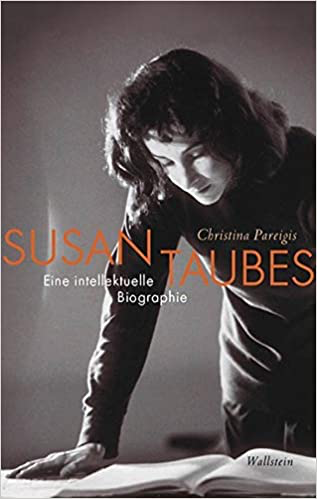
Christina Pareigis, Susan Taubes. Eine intellektuelle Biographie (Göttingen: Wallstein Verlag, 2020). This is a really fascinated account of Taube’s life and the intellectual-artistic circles she was part of both in Europe and, when she taught at Columbia, in New York in the 1960s. Taubes is a modernist philosopher of sorts. She brings traditional European thought into an American context. She works in philosophy, but is also involved in performing arts. Like many other women philosophers, she is open towards non-Western arts and philosophy. Her letters are astounding—packed with philosophical reflections. Her work on Simone Weil, springing out of her dissertation from Radcliff, is original and refreshing. Taubes, who was fairly close with Susan Sontag, also wrote literature, including the harrowing Scheiden tut weh , translated into English as Divorcing (New York: New York Review of Books, 2020). I am eager to find out more about and do some work on Taubes and her philosophical contributions. I also think this is a reminder that intellectual biographies can be quite worthwhile. I’m, for example, eagerly awaiting Lydia Moland’s work, in that genre, on Lydia Maria Child (forthcoming with the University of Chicago Press).
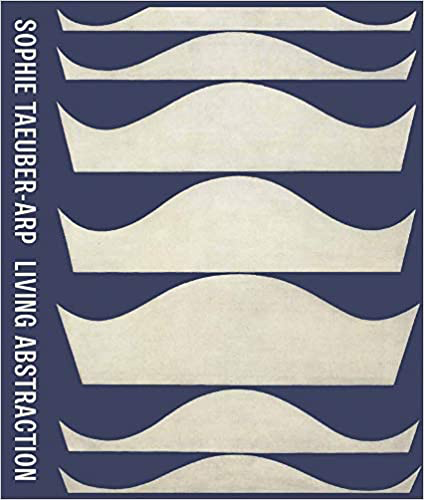
Sophie Taeuber-Arp: Living Abstraction , ed. Charlotte Healy et al. (New York: MoMA, 2021). Am I allowed to mention a non-philosophical work, or even an exhibition? This account of Sophie Taeuber-Arp’s work was published in conjunction with MoMA's retrospective of her work. The New York Times’ reviewer writes that her work is so covetable that he wanted to squeeze it. That pretty much sums it up. Taeuber-Arp is an amazing artist. Just like the women philosophers I’ve been working on lately, she refuses to let herself be reigned by traditional aesthetic classification: arts and crafts, sculpture, fabric, embroidery, puppets—she does it all, sometimes at the same time. As a philosopher working in the field of aesthetics, Taeuber-Arp’s work gave me a lot to think about. To what extent are the philosophical categories we use to describe modern art deeply gendered and fit, mostly, to describe and understand the works of a particular group of artists (mostly white males)? I had similar questions when I saw the marvelous Lee Krasner show at the Barbican. It is impossible to do aesthetics, I find, without staying in touch with the art world some way or other. And works such as those by Taeuber-Arp really bring up unexpected points of connection between my interest in women philosophers and my interest in aesthetics. There are, for a start, obvious points of connection between the larger sense-oriented understanding of human existence that we get in Salomé and the extreme tactility of Taeuber-Arp’s work.
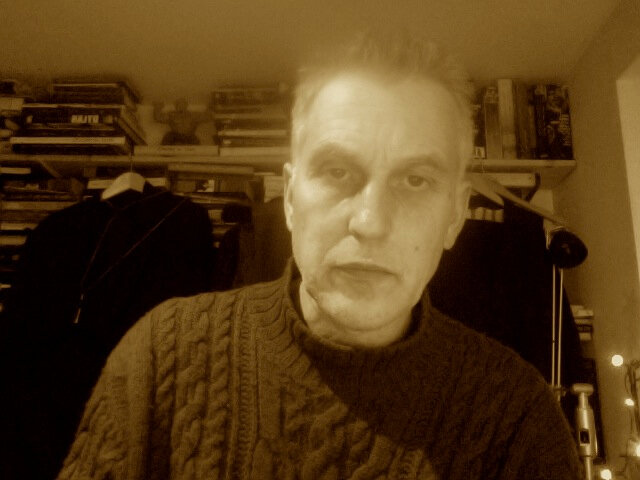
ABOUT THE INTERVIEWER
Richard Marshall is biding his time.
Buy his second book here or his first book here to keep him biding!
End Time series: the themes
Huw Price's Flickering Shadows series.
Steven DeLay's Finding meaning series
Josef Mitterer's Josef Mitterer'sJosef Mitterer's The Beyond of Philosophy serialised
NEW: Art from 3:16am Exhibition - details here